The Huc Bridge – Iconic Red Bridge Over Hoan Kiem Lake
Representing Vietnam’s historical and cultural legacy, The Huc Bridge is among Hanoi’s most famous sites. Tucked across the calm Hoan Kiem Lake, this remarkable red wooden bridge draws tourists from all around for its appeal, beauty, and strong historical background. Let MOTOGO Tours explore this bridge.
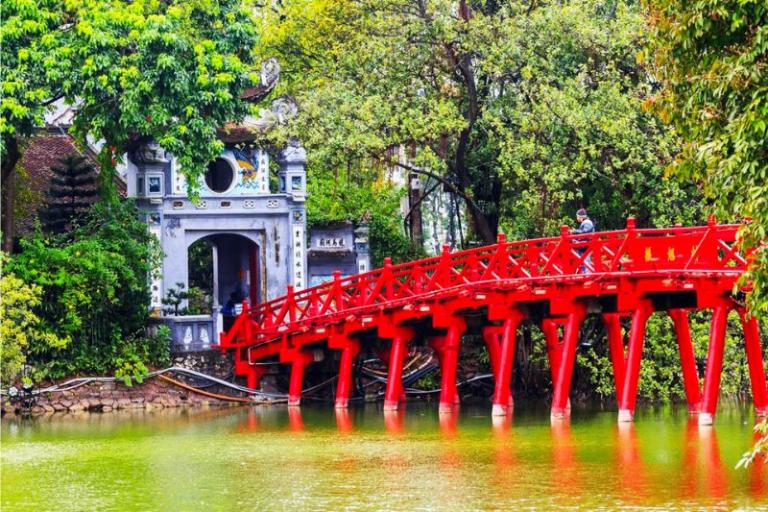
Historical Significance of The Huc Bridge
One of historical landmarks in Hanoi, the The Huc Bridge has great historical value reflecting Vietnam’s rich cultural legacy. Built under the tenure of one of the most revered Nguyen Dynasty monarch, Emperor Tu Duc, in the middle of the 19th century, the bridge became a spiritual and cultural emblem for the city and its people rather than only a means of access over Hoan Kiem Lake.
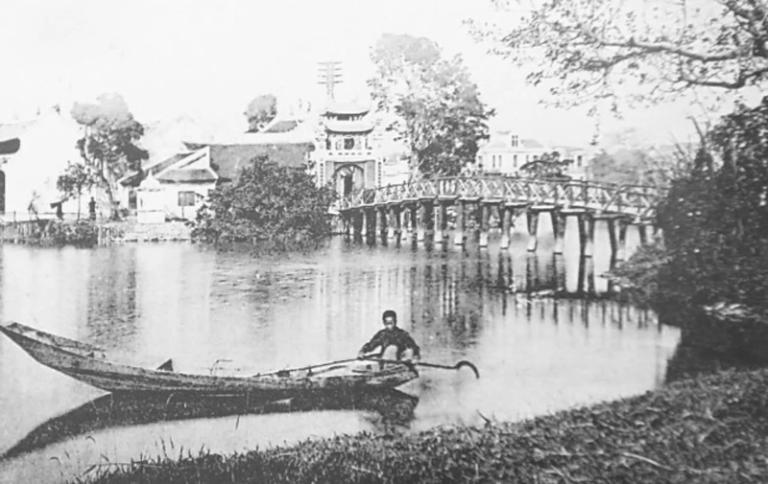
Built first in 1865, the bridge’s goal was to link the holy Ngoc Son Temple on Jade Island to Hoan Kiem Lake’s shore. General Tran Hung Dao, a legendary military commander noted for his valiant defense against Mongol invaders in the 13th century, is among the various gods this temple honors. The Huc Bridge evolved into a significant component of the local religious life as well, where pilgrims and devotees crossed to pay their respects and seek blessings by means of easier access to the temple.
The Huc Bridge’s building during this era also corresponded with Vietnam’s political and social revolution. French colonial troops were mounting pressure on the Nguyen Dynasty, which would finally cause Vietnam to become a French protectorate. In this setting, The Huc Bridge became a symbol of Vietnamese cultural preservation and resiliency against foreign control.
Architectural Features of The Huc Bridge
The simplicity and traditional architecture of The Huc Bridge reflect the core of Vietnamese culture and thereby constitute architectural beauty. Painted in a vivid red that contrasts with the calm waves and rich vegetation of Hoan Kiem Lake, the bridge is a wooden construction. The bridge’s spiritual relevance is enhanced by this stunning red hue, which in Vietnamese tradition represents good fortune and prosperity.
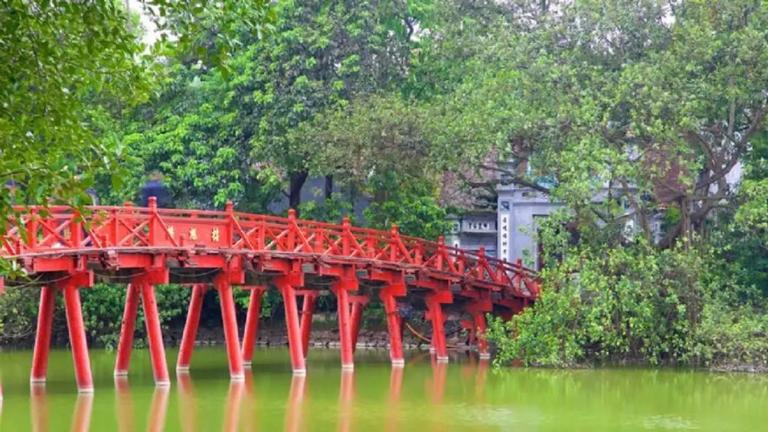
Built with painstaking attention to detail, the quintessential Vietnamese architectural example is The Huc Bridge. It elegantly crosses Hoan Kiem Lake, with a softly curving curve that recalls the form of a dragon’s back, a monster honored in Vietnamese mythology. Apart from improving the bridge’s aesthetic attractiveness, this curve captures the harmony and fluidity between nature and manmade constructions.
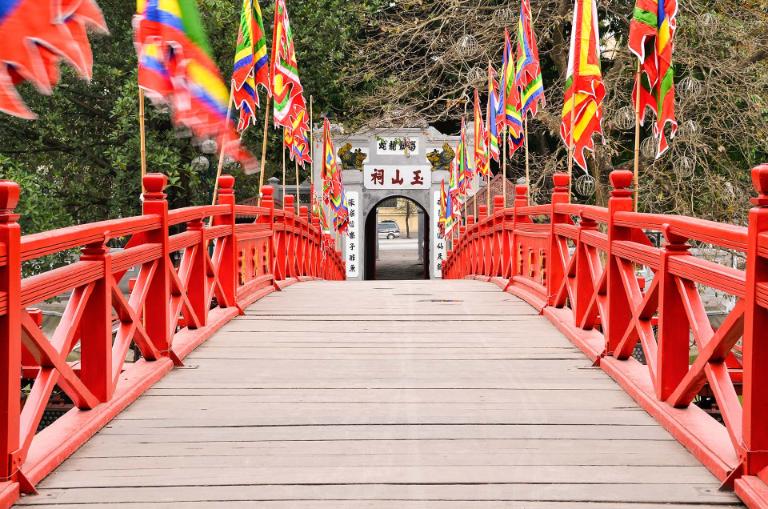
Built structurally from exquisite wooden beams and boards, the bridge is supported by a sequence of stilts reaching into the lake. Strategically placed along the bridge’s length, these stilts elevate it like if it were floating above the sea. Its structure reveals clear workmanship in the exact joinery of the hardwood beams, guaranteeing stability while preserving the classic look.
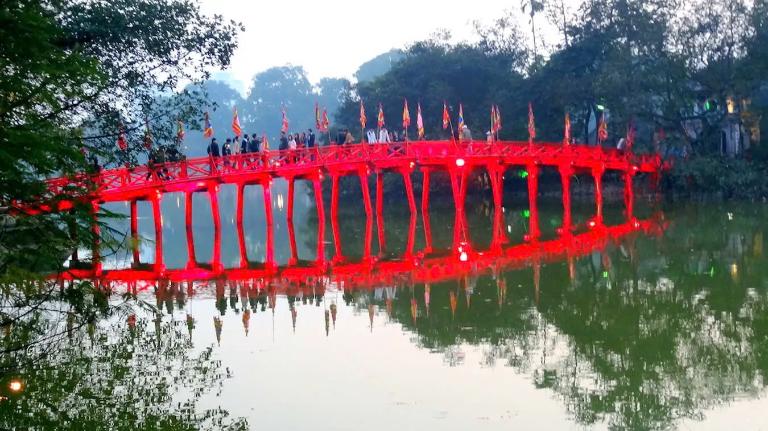
Though it is essentially a route to the Ngoc Son Temple, The Huc Bridge is much more than merely a useful construction. It stands for harmony between the physical and spiritual spheres. Inspired by both nature and mythology, the design of the bridge allows visitors to consider the deeper connotations connected with its symbolism.
>>> Let’s see more: Ho Chi Minh Mausoleum: A Comprehensive Guide to Vietnam’s Iconic Landmark
Location and Surrounding Attractions
Across the calm Hoan Kiem Lake, the The Huc Bridge is one of the most famous and legendary bodies of water in the nation. Tucked in the busy city, the lake and bridge provide a quiet haven combining historical significance with natural beauty. Here is a closer view of the neighboring attractions that make this region a must-see.
Hoan Kiem Lake: The Heart of Hanoi
Hoan Kiem Lake, sometimes known as “Lake of the Restored Sword,” is a symbol of the Vietnamese spirit and its rich legacy as much as a beautiful location. The lake itself is a serene spot for meditation and leisure; its still waters offer a haven from the rather busy metropolitan environment. Early morning or late afternoon leisurely walks would be perfect on the tree-lined paths since they provide lots of shade.
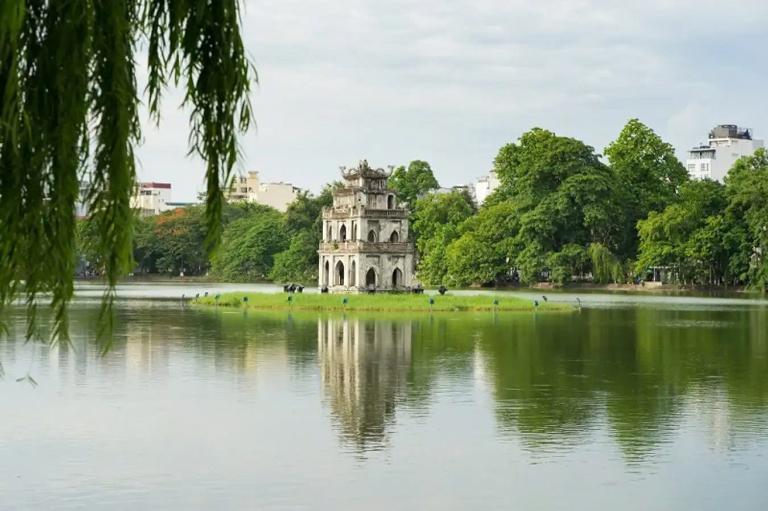
>>> Let’s see more: Exploring West Lake Hanoi: A must – visit place in Vietnam’s capital
Ngoc Son Temple: A Step into Vietnamese Spirituality
Ngoc Son Temple, sometimes known as the Temple of the Jade Mountain, lies at the northern end of The Huc Bridge. General Tran Hung Dao, a national hero who effectively fought 13th-century Mongol invasions of Vietnam, is among the historical and religious personalities honored in this 18th-century shrine. The shrine also respects La To, the patron saint of doctors, and the scholar Van Xuong, thought of as the deity of education and writing.
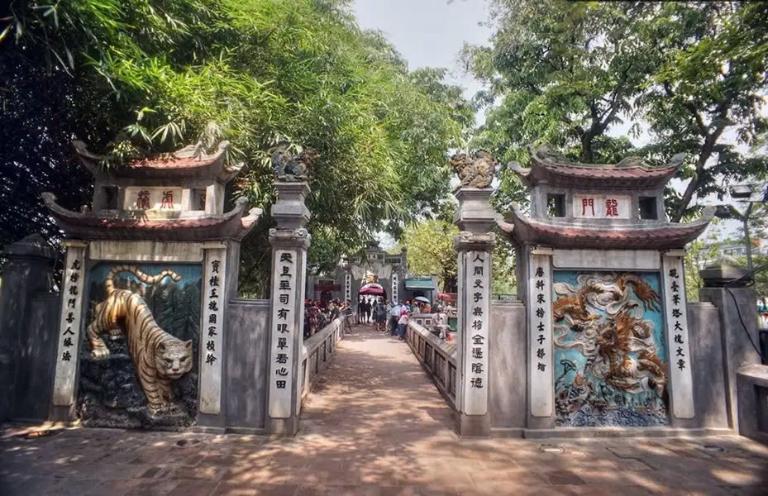
Turtle Tower: A Symbol of Hanoi
Situated on a little island in the middle of Hoan Kiem water, the Turtle Tower is a single construction enhancing the enchanted quality of the water. Particularly at sunrise or sunset when the light produces breathtaking reflections on the lake, visitors frequently stop along the lakefront to photograph Turtle Tower. The mix of French and indigenous Vietnamese architectural features in the tower accentuates the historical importance of the region even more.
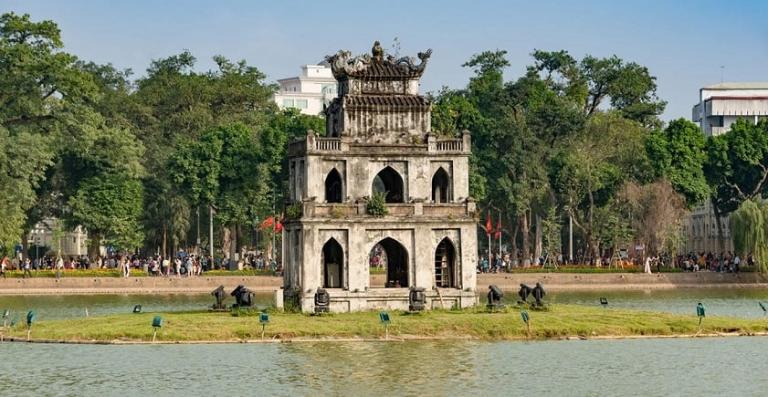
Hanoi Old Quarter: A Blend of Tradition and Modernity
From The Huc Bridge and Hoan Kiem Lake, Hanoi’s renowned Old Quarter—a maze of busy alleyways bursting with character and history—is just a short stroll. Though Hanoi is fast modernizing, this district, the oldest in the city, has kept its special appeal. From silversmithing and traditional medicine to textiles and souvenirs, every street in the Old Quarter specialized in one trade.
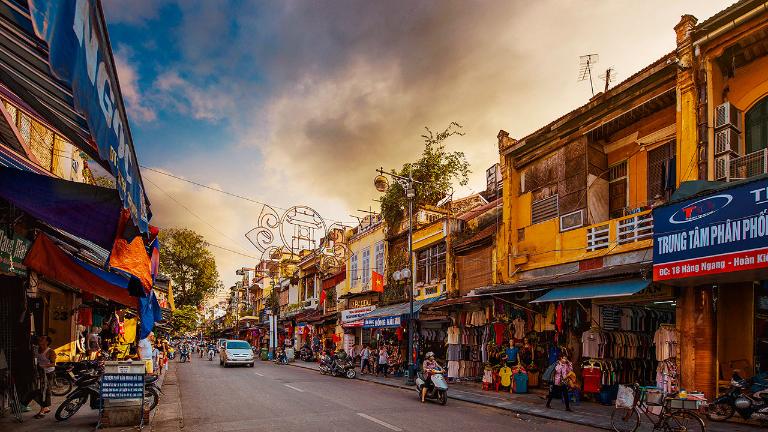
>>> Let’s see more: Explore the Vibrant Tapestry of 36 Streets Hanoi
Thang Long Water Puppet Theatre: A Traditional Vietnamese Artform
The well-known Thang Long Water Puppet Theatre, next to The Huc Bridge, lets guests see classic Vietnamese water puppet shows. Originating in the Red River Delta, water puppetry is a distinctive folk art form from the eleventh century. Puppeteers in these shows stand waist-deep in water behind a screen and move wooden puppets to depict tales from Vietnamese mythology and history.
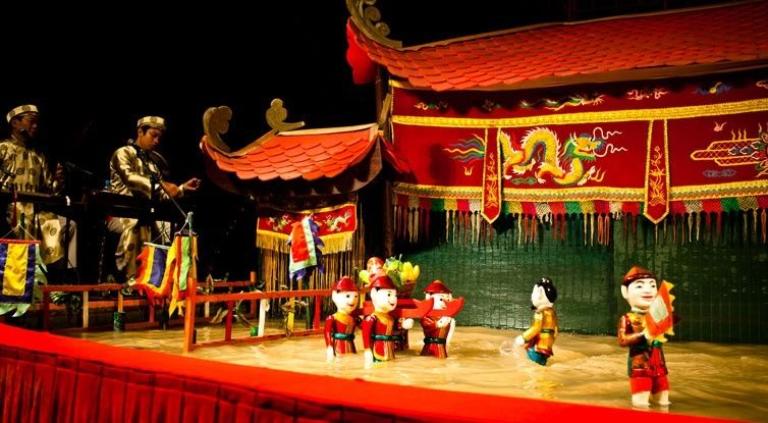
St. Joseph’s Cathedral: A Gothic Landmark
St. Joseph’s Cathedral is another close draw just a short stroll from Hoan Kiem Lake. Designed by the French colonial authority in 1886, this neo-Gothic church is a magnificent illustration of colonial architecture in Hanoi and reminds me of Notre-Dame de Paris. For the nearby Catholic population, the cathedral is still in use today and provides regular services, hence it is a major site of worship.
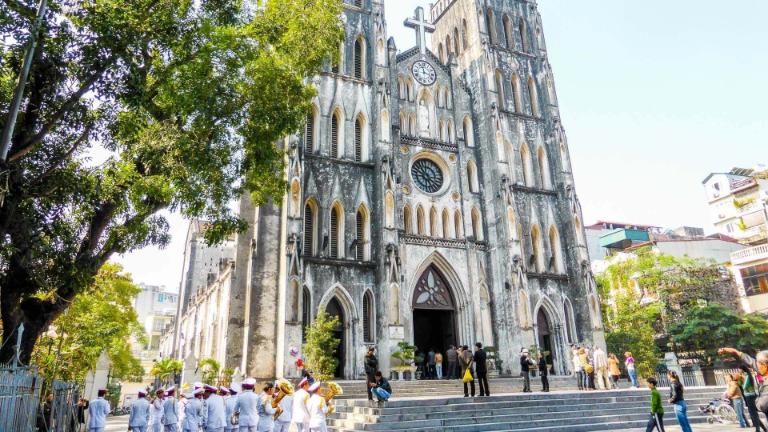
>>> Let’s see more: Hanoi Opera House: A Cultural Gem in Vietnam
The Huc Bridge represents Hanoi’s soul not only as a conduit to Ngoc Son Temple. This bridge presents a special chance for tourists to engage with Vietnam’s rich past because of its deep historical roots, amazing architecture, and cultural relevance. The Huc Bridge guarantees an amazing experience regardless of your interests—photography, history, or just appreciating the vistas.
Related Posts:












Be the first to comment!